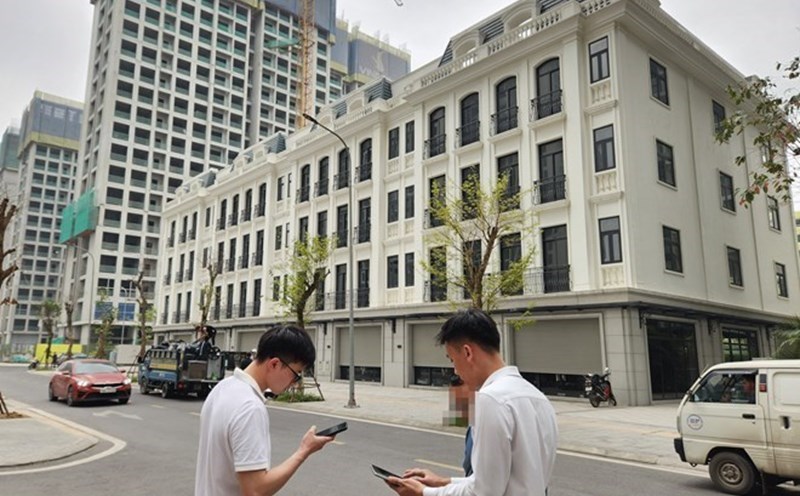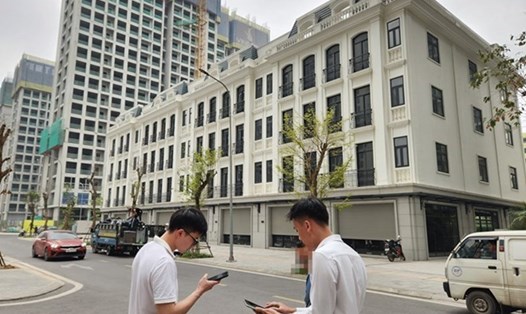Warning about risks
The State Bank of Vietnam (SBV) branch in Region 2 (SBV2) said that it has recently received frequent petitions from citizens reflecting that commercial banks (CIs) lend to pay deposits according to the agreement in the Agreement to real estate consulting and brokerage units.
According to the content presented in the petition, citizens were upset and thought that the commercial banks had many violations in the process of granting credit to citizens for the above purpose.
Some risks and consequences when commercial banks lend for the purpose of paying deposits according to the agreement in the Agreement Document are pointed out by the State Bank of Vietnam KV2 in specific cases.
The first is legal risks, disputes, and lawsuits. For example, recently, the People's Court of Ho Chi Minh City Region 7 has tried and issued a verdict (not yet legally valid due to appeal), in which it determined that the content of the agreement on deposit, progress, deposit duration, deposit payment method, and deposit handling in the Agreement was contrary to legal regulations, therefore the Agreement was invalidated due to violating the prohibition of the Law as prescribed in Article 117, Article 123 of the 2015 Civil Code.
On October 7, 2025, the Ho Chi Minh City Department of Construction issued a Decision to handle administrative violations against a consulting and brokerage company for real estate business that does not fully meet the conditions according to regulations or is not allowed to be put into business according to regulations related to the consulting and brokerage company signing an agreement with customers.
At the same time, the Ho Chi Minh City Department of Construction also issued Document No. 11410/TB-SXD-QLN&TTBDS dated October 10, 2025 announcing compliance with legal regulations on public disclosure of real estate information, real estate projects put into business in the city (for real estate businesses, real estate projects).
Including the proposal that real estate businesses and real estate projects in Ho Chi Minh City are not authorized to authorize other organizations and individuals to sign deposition, sale, transfer, lease-purchase contracts for houses and construction works...
Thus, in the case where the Decrees are contrary to legal regulations and are declared invalid, the State Bank is likely to face great legal risks, dispute risks, and complaints and will have difficulty in debt collection and property handling.
Second is the risk of bad debt, credit risk and financial loss risk. That is, the bank disburses to customers to pay deposits according to the agreement in the Agreement Document to consulting and brokerage units to be able to buy real estate when the investor is eligible to sell real estate according to the provisions of law.
Therefore, in case the project is behind schedule, suspended or does not meet the conditions for continued implementation and if before that, when implementing the loan, the bank has not fully assessed the financial capacity of the consulting or brokerage unit, and has not comprehensively controlled the disbursement cash flow, the bank may face increased costs, bad debts, directly affecting the bank's rights and ability to collect debts, causing the risk of financial losses and capital loss.
Third is operational risks and reputation. When a bank provides credit to pay the deposit according to the agreement in the Agreement, in case the brokerage or consulting unit cannot comply with the commitments and agreements and there are disputes, complaints, and lawsuits between related parties, citizens will often think that the bank and the consulting and brokerage units will coordinate to commit acts that violate legal regulations, coordinate to deceive citizens.
Tightening lending activities for real estate purchase deposits
From the above comments, SBV2 requires banks to temporarily suspend lending to pay deposits according to the above-mentioned Agreement (or similar form) until there is an official conclusion from the competent authority.
In case the competent authority concludes that the Agreement (or similar form) is not illegal, in case of continuing to lend, it is recommended that commercial banks develop a specific process for the above borrowing purpose to limit risks.












